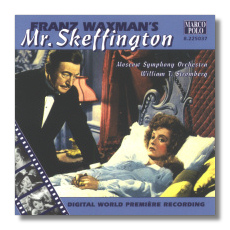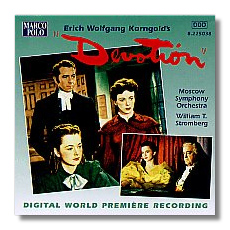
The Internet's Premier Classical Music Source
Related Links
- Latest Reviews
- More Reviews
-
By Composer
-
Collections
DVD & Blu-ray
Books
Concert Reviews
Articles/Interviews
Software
Audio
Search Amazon
Recommended Links
Site News
 CD Review
CD Review
Film Scores Reconstructed by John Morgan

Franz Waxman
Mr. Skeffington
Moscow Symphony Orchestra/William T. Stromberg
Marco Polo 8.225037 DDD 62:57


Erich Wolfgang Korngold
Devotion
Moscow Symphony Orchestra/William T. Stromberg
Marco Polo 8.225038 DDD 69:40
Warner Brothers' Mr. Skeffington was a great vehicle for Bette Davis because it showed her metamorphosis from a spoiled (but actually impoverished) and faithless society beauty into a diphtheria-scarred, sadder-but-wiser woman who realizes just before it's too late that "a woman is beautiful only when she's loved." The man who really loves her is her unglamorous businessman husband Claude Rains, the Mr. Job Skeffington of the title. Nevertheless, Fanny Skeffington's infidelities and coldness drive him away to Europe, where the Nazis blinded him. At last he returns and forgives her. The tear-jerker finale finds the disfigured Fanny leading the blind Job up the stairs of their home, reconciled at last. Sure it's corn, but it's hot and buttery, and Franz Waxman's music makes it all that much more delicious.
If the sentimentally susceptible Max Steiner had scored Mr. Skeffington, the film might have lost whatever backbone it had. Waxman was a great choice. He wrote memorable themes for the two main and several subsidiary characters, and he deploys them with a generosity and imagination worthy of Richard Strauss. Bill Whitaker's notes call this chromatic and lyrical score "perhaps the best Strauss score not written by Strauss," and he is not wide of the mark. Mr. Skeffington's music is patient, centered, caring, and yet a little formal, and Waxman subtly reminds listeners that Job is a Jew; after all, this is an important plot device. Fanny's music is skittish and harmonically unsettled, and Waxman turns her theme upside-down and rightside-up to show what kind of a woman she is. Later in the score, when she has lost her looks and her suitors, Waxman approaches frank atonality – a pretty rare device for a Hollywood score of that era. Mr. Skeffington gave Waxman many chances to explore unusual instrumental timbres. A solo violin – both electric and acoustic – appears at pivotal emotional points, and scoring for celesta creates a mood of vulnerability. Waxman uses a novachord (an early electronic instrument) to create a chilling atmosphere for Job and Fanny's reunion. There is a lot of beautifully melancholy writing for the woodwinds as well. Waxman also quotes from period songs ("Bye Bye Blackbird" to "Deutschland über Alles") to set time and place. Interest never flags during this nearly 63-minute CD, and it can be enthusiastically recommended to anyone who likes ultra-ripe romanticism.
Devotion was a Warner Brothers production from 1943, just one year before Mr. Skeffington. The film wasn't released until 1946, however, and it died a well-deserved death. It purports to be a biopic about the Brontë family, but it has little to do with factual accuracy, and as little to do with a competent script. There are good performances by Ida Lupino and Olivia de Havilland, but today, Erich Wolfgang's Korngold's music is the most memorable thing about Devotion. The score holds no surprises for fans of this composer. There are warm, central European melodies all over the place, and when love or death is on the screen, Korngold responds with appropriate passion. Annotator Brendan Carroll (author of an excellent biography about the composer) identifies nine primary themes – one to represent the Brontës, seven to represent each of the main characters and one to represent Emily's recurring dream about a horseman (who in turn represents Death). Suffice it to say that this is a melodically generous score, and full of Korngold's characteristic delicacy and good taste. The orchestrations were done by no less than six individuals, surely a record for a Korngold film! It is remarkable how well the score hangs together, in spite of the many hands that touched it. Having said that, I must remark that its nearly 70-minute length is not quite as absorbing as Waxman's score. Nevertheless, Devotion is an example of old-fashioned scoring at its best, and it is a powerful listening experience in its own right.
While Stromberg and the Moscow Symphony Orchestra don't quite reach the level of Charles Gerhardt and the National Philharmonic Orchestra (the strings are not as assured, the overall sound not as rich), each new recording with this team brings new pleasures. Stromberg understands this music, and the Russian players approach it without preconceptions, but with plenty of enthusiasm. The engineering is excellent, and both releases feature very complete notes about the film and the music itself. Kudos to Marco Polo for bringing these scores the attention they deserve – both are receiving their digital world première recordings here.
Copyright © 1999, Raymond Tuttle


















